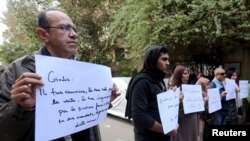Egypt has again denied police involvement in the killing of an Italian research student whose mutilated body was found early this month in the Egyptian capital.
Speaking Monday in Cairo, Egyptian Interior Minister Magdi Abdel Ghaffar rejected published Italian speculation that security forces played any role in the death of 28-year-old Giulio Regeni.
"There are many rumors repeated on pages of newspapers insinuating the security forces might be behind the accident," Abdel Ghaffar said. He went on to call the reports "unacceptable," saying, "Egyptian security agencies are known for integrity and transparency."
He also said an investigation of the death is under way.
Regeni — a Cambridge doctoral student researching Egypt's labor movement — was last seen January 25 as he headed to meet a friend in downtown Cairo. His body was found along a Cairo roadway February 3, in what authorities initially called a road accident.
Nails missing, fingers broken
After an initial examination in Cairo, the body was returned to Rome, where a second autopsy showed Regeni had suffered numerous fractures, including a broken neck, as well as stab wounds and cigarette burns.
Italy's La Repubblica newspaper reported Monday that Regeni's fingernails and toenails also had been ripped away and that all of his fingers had been broken.
International rights groups and their Egyptian allies have regularly accused Egypt's authoritarian security apparatus of torturing activists and Islamists — in some cases without ever having reported their arrests.
Numerous Italian news outlets quote Italian prosecutors as strongly suspecting that Egyptian police interrogated Regeni about his contacts with activists before torturing and killing him.
Regeni's January 25 disappearance coincided with the anniversary of the 2011 Arab Spring uprising that toppled former autocrat president Hosni Mubarak and led to the eventual rise of army chief Abdel Fattah el-Sissi to the presidency.
The army leader seized power in a 2013 coup that ousted Egypt's first freely elected president, Islamist Mohamed Morsi.
El-Sissi then launched a fierce crackdown on dissent, jailing thousands of Morsi supporters and activists.




